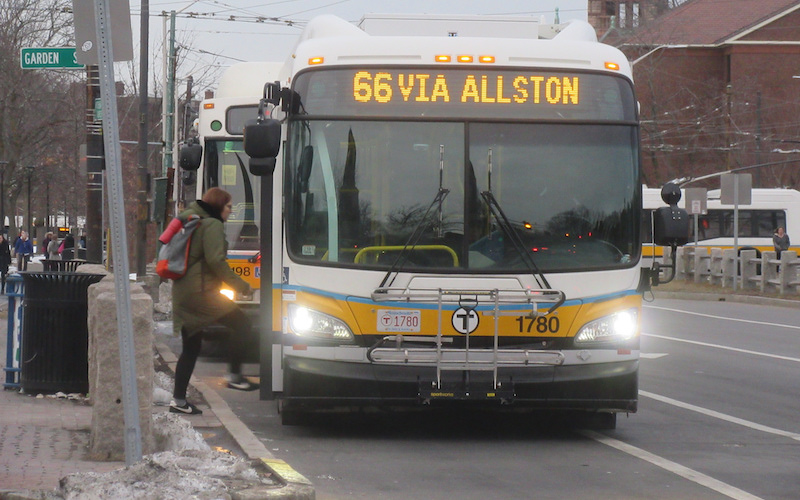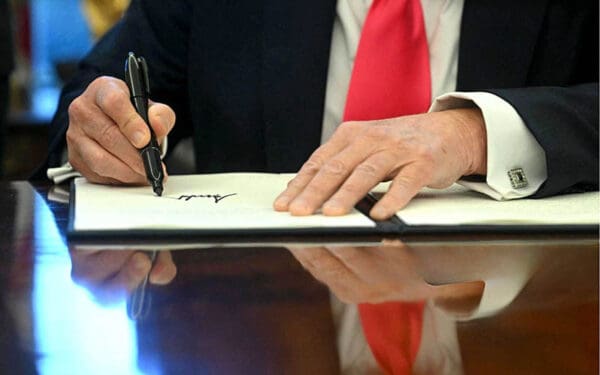
The MBTA is at a critical juncture, with fare increases, a new system for collecting that fare, and improved bus service in greater Boston all in the works. Photo: Jason Lawrence
Public transit is a civil right. Everyone – no matter their race, age, physical ability, or income – should be able to move freely between the places we live, learn, work, worship, and play, knowing that the service is efficient, reliable, and affordable. Such a system, one that people can rely on, can also get cars off the road and cut air and carbon pollution.
That system is not the one we have in Massachusetts today. Low-income riders, people of color, and immigrants must often put up with less frequent service and have longer commutes compared to higher-income, white riders.
But that can change. Right now, we’re at a critical juncture when it comes to improving our public transit system. The MBTA has three big projects in the works, all of which are connected: fare increases, a new system for collecting that fare, and improved bus service in greater Boston.
These projects are an opportunity to make the system work better for everyone. Here’s how the MBTA can get it right.
Fare Increases Must Deliver More Reliable Rides for a Reasonable Price
In late January, the MBTA announced its proposal to raise fares an average of 6.3 percent, bringing the cost of a single bus ride from $1.70 to $1.80 and subway ride from $2.25 to $2.40. State law requires fare hikes at regular, modest increments, not more than 7 percent every two years. But they also should be predictable and only done when necessary. And when fares are raised, riders must see improvements in service in return.
Those improvements should include better bus service for the riders who depend on it most and implementing expansion projects promised decades ago. We have been waiting nearly 30 years for the Red-Blue Connector and Green Line Extension.
But what will be the good of these service expansions if the T becomes so expensive that riders choose other modes of transportation?
We must strike a balance between keeping the T affordable for all riders – especially riders in low-income communities and communities of color – and funding long-term project commitments.
Better Bus Project Will Make Necessary Changes to Bus Routes
Those of us who rely on MBTA bus service every day know that too many bus routes are unreliable. Buses often fail to arrive on schedule and are sometimes so crowded riders must wait for the next bus – in the hopes that one will be on time. The MBTA’s Better Bus Project is a commitment to fix the bus network. The T recently released a proposal for improving bus service, which includes consolidating duplicative routes, improving bus stop spacing, and eliminating parts of the route that no longer make sense. While long overdue, this first phase is a step in the right direction and could take effect as soon as September 2019. It can be accomplished without raising fares.
However, the T must focus on designating funds for a second phase of improvements as soon as possible, including adding more buses to key routes along congested and underserved corridors like Route 28, which serves Roxbury, Dorchester, and Mattapan; Route 111, which serves Chelsea; and Silver Line 5, which connects Dudley Square to Downtown Boston.
More frequent bus service in communities of color means more reliability, which, in turn, increases ridership. More riders will boost revenue for the MBTA and take more cars off the road, cutting climate-damaging emissions, air pollution, and congestion – all things we need for our community and economic health.
New Fare System Needs to Take Cashless Concerns into Account
In addition to raising fares and improving bus service, the MBTA is developing a new way to pay for your ride, called Automated Fare Collection 2.0. When complete, you will be able to board any part of the T system – bus, subway, commuter rail or ferry – by tapping your Charlie Card or phone. This proposed system has benefits, but also some drawbacks that must be addressed.
On the plus side, it promises to get bus riders to their destination faster thanks to an easier boarding process and reduced wait times. Also, the current fare vending machines limit how the T can charge riders. The new system could allow the T to charge deeply discounted fares for low-income riders and residents of environmental justice communities that rely on public transportation. It could also expand successful programs like the Youth and Senior passes.
On the down side, however, the new machines won’t have a way for people to pay cash for bus and trolley rides. Without a cash option onboard, riders will have to find the closest automated fare retailer where they can reload their Charlie Card using cash. Because a high number of low-income residents rely on cash to use the MBTA, the new system will force riders to choose between going out of their way to put money on a card or risking riding without paying their fare. This scenario could lead to increased transit police enforcement for fare evasion, bolstering criminal convictions and needlessly contributing to negative interactions between low-income riders and the MBTA Police.
These drawbacks can and should be addressed before the new system is tested and implemented. We cannot leave any rider without an easy way to pay their fare.
Public Transit Should Serve the Public Equitably
The T should be considering fare changes that are, well, fair to all riders, and that improve our experience. Fare increases and future bus system changes should not make it harder for riders to access the services on which they depend. We must continue to fight for riders of all races, economic status, immigration status, and mobility needs to access the system and ride with dignity.
As the MBTA considers these changes, you can let them know what you think of the proposals. Make your voice heard at public meetings or comment about the fare increase online by March 7, 2019 and the Better Bus Project online by March 13, 2019.



